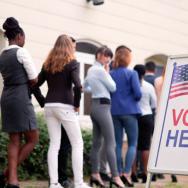Ninety-one percent of adults say the spread of misinformation is a problem and most believe misinformation contributes to extreme political views and hate crimes, according to a new University of Chicago Pearson Institute/AP-NORC Poll.
With the midterm elections approaching, significant majorities of Democrats, Republicans, and independents believe misinformation is a problem. Nearly three-quarters of the public are at least somewhat concerned they have been exposed to misinformation, and just under half are worried they have spread misinformation.
The public believes misinformation is having serious consequences. More than half of adults say misinformation increases political engagement, and about 7 in 10 say misinformation increases extreme political views and hate crimes such as violence motivated by race, gender, or religion. About half also say misinformation decreases trust in government.
Given the widespread concerns about misinformation, majorities of adults report engaging in behaviors at least some of the time to avoid consuming or spreading misinformation such as checking multiple sources or even deciding not to share content on social media at all.
The nationwide poll was conducted by the Pearson Institute and The Associated Press-NORC Center for Public Affairs Research from Sept. 9-12, 2022, using AmeriSpeak®, the probability-based panel of NORC at the University of Chicago. Online and telephone interviews using landlines and cell phones were conducted with 1,003 adults. The margin of sampling error is +/- 4.0 percentage points.
The poll was released in conjunction with the 2022 Pearson Global Forum, an event at the University of Chicago that brought together researchers and policymakers to develop strategies to prevent and resolve international conflicts.
—Adapted from a story first published on the AP-NORC website.

